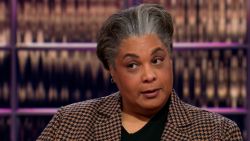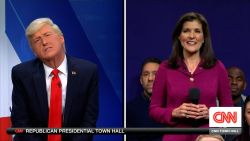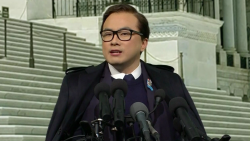The Department of Justice on Monday formally adopted policies sharply restricting the instances in which prosecutors can seek records or testimony from reporters.
The agency’s new policies were outlined in a memo issued by Attorney General Merrick Garland.
“This new prohibition applies to compulsory legal process issued to reporters directly, to their publishers or employers, and to third-party service providers of any of the foregoing,” Garland said in the memo.
“As with the current regulations, this prohibition on compulsory process does not apply to obtaining information from or records of a member of the news media who is subject or target of an investigation when that status is not based on or within the scope of news gathering activities,” Garland added.
The news comes after The Washington Post, CNN, and The New York Times learned earlier this year that the Trump Justice Department had seized records of some of their reporters.
CNN’s general counsel, David Vigilante, was even bound for nearly a year by a gag order that prohibited him from discussing or acknowledging that the government was seeking to compel the disclosure of emails from Pentagon correspondent Barbara Starr.
A similar gag order was also placed on The Times.
When news organizations first reported publicly what had happened, President Joe Biden vowed to end the practice.
Press advocates have called for regulations to be codified into law so that future administrations do not resume the practice of targeting journalists. Garland noted in his Monday memo that he has asked Deputy Attorney General Lisa Monaco to conduct a review to develop regulations for that purpose.
Still, news organizations whose reporters had their records seized celebrated the Justice Department’s announcement.
“The attorney general has taken an important step toward ensuring the abuses of the past do not reoccur and that freedom of the press is protected,” said Fred Ryan, publisher of The Washington Post.
“The new policy, which largely bars federal prosecutors from subpoenaing news media records or testimony, represents a significant step forward in the protection of press freedom,” added A.G. Sulzberger, publisher of The Times. “But there is still more to be done and we urge the Biden administration to work with Congress to pass a federal shield law to make these improvements permanent.”
“This is a significant step forward for the protection of all journalists,” a CNN spokesperson added. “CNN commends the Department of Justice for protecting the ability of journalists to hold those in power accountable. We look forward to the Department using this as a basis to change DOJ regulations to make them consistent with the Attorney General’s memorandum.”
The American Civil Liberties Union also praised the change as a “major step forward in protecting journalists against government spying and safeguarding a free press.”
Elie Honig, a CNN senior legal analyst and former federal prosecutor, described the policy shift as a “sea change” for the Justice Department.
“While DOJ has long sought to minimize intrusion on the media’s First Amendment-protected rights to gather information without governmental interference, the new memo substantially raises the bar,” Honig said. “Most importantly, DOJ now will categorically refrain from issuing subpoenas or otherwise encroaching on the media’s legitimate news-gathering process. Journalists and sources alike can rest easier knowing they will not be monitored or investigated for their participation in the normal course of reporting.”






















